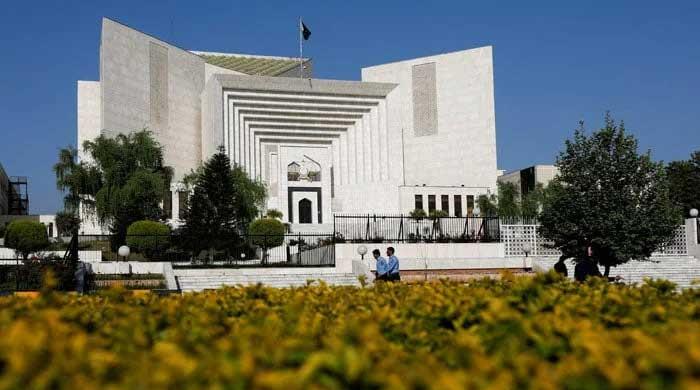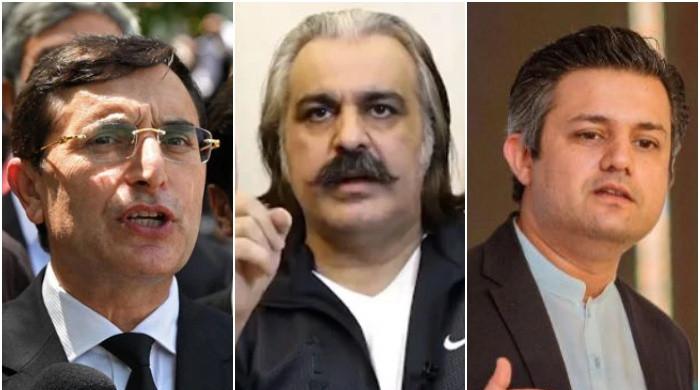Federal cabinet abolishes ministries' budgetary allocations for entertainment, gifts
'There were some provisions in ministries, divisions, under which funds were allocated for 'chai and pani'', says Firdous Ashiq Awan
May 07, 2019
ISLAMABAD: The federal cabinet on Tuesday decided to abolish budgetary allocations of all the ministries and divisions meant for entertainment and gifts, aiming to ensure judicious utilisation of public money for welfare of the common man.
"There were some provisions in ministries and divisions, under which funds were allocated for 'chai and pani (tea and water)'," Special Assistant to Prime Minister (SAPM) on Information and Broadcasting Dr Firdous Ashiq Awan said while briefing media on the Federal Cabinet meeting.
"The cabinet has formally abolished these provisions today. So now there will be no entertainment and gift funds there."
She said the cabinet also decided to end the culture of additional charge in all the ministries and divisions within next three months as such posts would be filled properly.
No summary for approval of additional charge would be presented in the cabinet in future, Awan added.
The SAPM said the cabinet meeting, chaired by Prime Minister Imran Khan, deliberated on 16 agenda items, and most important among them was ensuring improved supply of electricity to consumers during the holy month of Ramzan, especially at Sehr and Iftar hours.
She said the cabinet ratified the decisions of previous meeting of Economic Coordination Committee.
Firdous Ashiq Awan said the cabinet was briefed by Education Minister Shafqat Mahmood regarding initiatives to bring 30,000 Madaris into national mainstream.
She said wrong perception was made in media that these Madaris would be under the Ministry of Education, adding, "These would rather be linked with the ministry but work independently".
Awan said the education minister apprised the cabinet that one window registration of these Madaris and monitoring of their funds were important for their mainstreaming.
She said the ministry would play the role of a facilitator to the Madaris, adding that modern education was the right of every child studying at these seminaries.
“We wanted to provide modern and quality education to them as they are also our children” the SAPM said.
She said the students would also be taught about use of social media so that they could be brought out from isolation.
As per the vision of Prime Minister Imran Khan, Awan said a uniformed curriculum would be introduced in all schools and Madaris.
While, Ministry of Education would also assist the foreign students studying in these Madaris, she added.
In addition, she said, vocational training would be imparted to Madressah students for their capacity building so that they could be more useful member of the society after passing their graduation.
The SAPM said the cabinet also ratified agreement on technical cooperation between Pakistan and Brazil, besides it approved the annual report of Securities and Exchange Commission of Pakistan (SECP) that would be presented in the parliament.
She said the cabinet was also informed about the steps taken by the Ministry of Health to reduce the prices of medicines.
Awan said the cabinet had decided to renew the licences of cellular companies worth $449 million.
The meeting had also decided to establish Pakistan-China Engineering University at PM House, she said, adding Beijing would provide about Rs400 billion for the varsity.
The SAPM said the cabinet had also decided to reactivate Pakistan Steel Mills through public private partnership.
Expressed confidence that the next federal budget would be in line with the public expectations, she said all allied parties would be taken into confidence before presenting the fiscal budget in the parliament.
Commenting on PML-N leader Nawaz Sharif’s return to jail, Awan said it was unfortunate that a convicted person was going back to jail with such pump and show by his party.
She said in civilised societies, convicted persons were not glorified, adding that glorifying a convict tantamounts to committing the same crime.
“Nawaz Sharif is a convict and not an accused,” the SAPM said, adding that the former premier was violating all rules and laws of the jail manual.
Minister for Power Omar Ayub Khan said that government had set the target to get rid of the power circular debt by December 2020.
He said during 2017-18, the circular debt had increased by Rs 450 billion which would be brought down to Rs 293 billion during the current year and Rs 96 billion by 2019-20, however, the circular debt would be completely overcome by the end of next year.
Ayub said the prime minister was told that a 25-year plan had been finalised to bridge the ever increasing gap between demand and supply of electricity.
Moreover, a fresh policy for power production through alternate energy resources had been formulated, he added.
Under the policy, the minister said, 20 percent of total electricity would be produced from alternative resources by 2025 which would be enhanced to 30 percent by 2030. He said that the ministry’s drive to curb power theft and recovery of dues had brought in positive outcomes.
Within four months, the additional power dues worth Rs 48 billion had been recovered that would touch Rs80 billion mark by the year end and Rs190 billion till June 2020, Ayub said.
He said that government was especially focussing on handling the losses caused by theft, technical and transmission issues.
As a step to curb power theft, 27,000 First Information Reports (FIR) had been registered against those involved while 4,225 people had been arrested including 433 officials of the power sector, the minister said. Moreover, another 1,467 officials had been charge-sheeted.
He said that no power load shedding would be done on 80 percent feeders across the country during the holy month of Ramadan due to improved distribution and transmission system.
For rest 20 percent feeders, Ayub informed, a load management plan had been formulated in accordance with the losses and where the ratio of power theft was above 80 percent.
He, however, said it has been ensured to provide uninterrupted power supply during Sehr and Iftar.
The minister said the previous governments had failed to incorporate the expenses incurred on net hydel profits and different power projects in power tariff, which was why the consumers were bearing an additional burden now.
He assured that Tribal Electric Supply Company would provide electricity for 10 hours each day instead of four hours in the tribal districts and there would be no load shedding during Sehri and Iftar during Ramazan.
Ayub said electricity more than that could not be supplied because of lack of infrastructure.
“We will build the infrastructure and install feeders, conductors and poles to improve the system and provide the same kind of facilities as available in other areas of Khyber Pakhtunkhwa,” he said.
About the prices of petroleum products, he said that the PTI government had decreased the GST and Petroleum Levy on the products as compared to previous governments.











